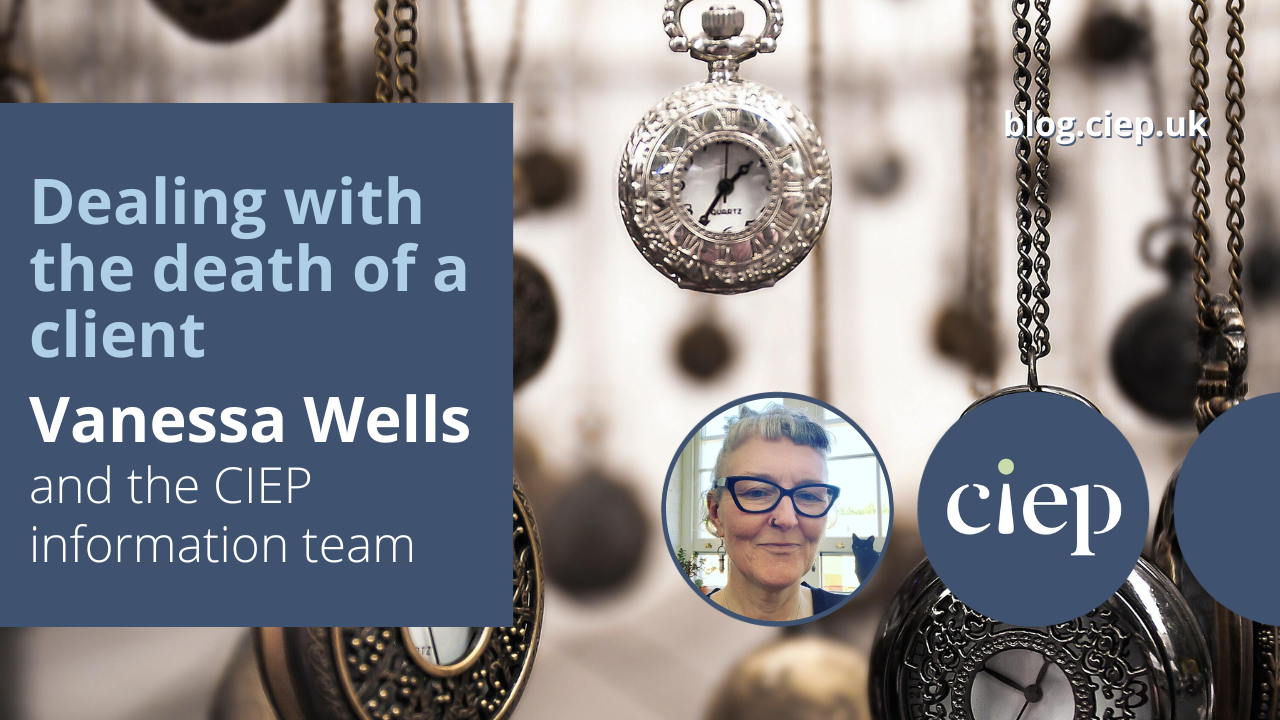In this post, Vanessa Wells reflects on what happened when one of her repeat indie clients died unexpectedly. The CIEP information team also give some practical tips for dealing with the death of a client.
Vanessa’s experience
I’ve been editing for a decade and last week had my first experience of the death of a client.
This fellow was a repeat client. He’d been nominated and shortlisted for awards for his excellent books. He was the type who paid literally within five minutes of receiving my invoice. He was thoughtful and appreciative of the editing process. In short, he was the ideal client.
I was going to edit his next novel shortly; he just wanted a few more weeks to tweak the manuscript. Meanwhile, I’d come down with Covid, and when I saw online the news of his death, I was gutted – perhaps made more emotional by feeling physically depleted but also because it was yet another good person gone: I’d lost a dear friend early on in the pandemic and a former student died by suicide this year. Aside from no longer having this great writer to work with, I started to wonder why his death hit me as it did.
The author–editor relationship
The longer I edit, the more I appreciate writers’ craft. I really am impressed with their abilities and, in those with perhaps less skill, their tenacity and courage. I don’t take lightly the idea that we are here to collaborate with authors, rather than rewrite their work as we see fit. What they produce deserves to be treated with respect, and how we interact with them and their text should be a safe space. Sometimes the vulnerability they reveal is shocking. There are projects where we are the first person to read what they have written. David Shannon wrote Howul while his wife thought he was watching footy every night in his den. So there can be a creative and intellectual intimacy with an editor that a writer doesn’t have with others. The more vulnerable the author, the more they are opening their heart to someone whose metaphorical red pen they fear. The trust they are placing in us to provide constructive suggestions can be immense.
Conversely, we might be the first person to validate their efforts. Perhaps their labour of love has been denigrated by others as just a hobby. We may be coaching someone who’s kept their desire to write a secret or an untried exercise for decades. The analogy to writers birthing their babies may be a bit hackneyed, but I’m very conscious of the midwifery role I play.
As a sensitive person, I know what it feels like to be corrected. I bear that in mind in the wording of my comments and suggested edits, regardless of whether my feedback is gently critical or laudatory (and usually it’s a delicate balance of the two). I often feel like I learned the dynamics of this from my twenty years of teaching, also moulded by my own student experience of both kind and mean teachers. We have the power to inspire or wound (be it as editors or just in everyday life), and sometimes we can discern something of our clients’ personalities from their first emails to us. A tentative little dance underlies their questions, which can make us feel sympathetic and perhaps already a little protective of them in the process they’re about to take on.
I think this special type of relationship is not common to many professions, and the resulting connection that is lost upon a client’s death can leave us feeling gutted.
Financial considerations and the future
A friend commented that my author’s death must have come as a financial blow, too – which it did. I hadn’t asked him for a non-refundable deposit as I knew how reliable and accommodating he was. (And, in fact, fate unexpectedly dropped a new indie client in my lap the same day.) But even if I had been more proactive about using my usual contractual practices with him, I certainly would never have kept the deposit. Perhaps if there were different circumstances with, say, a single author and an executor, I might consider pursuing my balance owing if I had (almost) finished an edit. But as an editor, I believe my business is as much about the writer as the text, and I would not be comfortable pursuing payment no holds barred.
I hope that one day my client’s wife will look me up in his email and offer to let me read his sequel. I appreciated him for his work, not the income. From what I’ve seen in social media posts about him since his death, he was widely admired for his character as much as his skill. I’m sorry to have lost him as a client, but I’m grateful for having had the opportunity to work on such excellent writing. Another loss during this difficult period, but another blessing to recognise in my career as an editor.
Blue skies, sir!
Practicalities: What to do if your client dies
If you are aware that your client has a terminal illness (you might, for example, be working on their memoirs), you should agree in writing the steps to take in the event of their death. This may cover who will contact you with news of their death, the proportion of the fee to be paid, and what to do with the manuscript.
You may, in fact, find it helpful to include such information in your contracts as a matter of course – and to include similar information for the client in the event of your own death or incapacity while you are working with them.
Be sensitive to the feelings of your client’s family and/or colleagues – and allow time for yourself to grieve, if necessary. Similarly, if you have only just found out that your client has died after chasing a response or asking for a new draft, try not to feel guilty if you think your approach seemed insensitive. You couldn’t be expected to know what had happened.
If you have completed the work and wish to be paid, you will need to be proactive. Again, try not to feel guilty – if you have completed the work and fulfilled your part of the contract, you have the right to be paid as part of the business transaction.
Corporate clients and publishers are likely to have accounts departments, which will be independent of your contact and have their own email address. Write to them, explaining the situation. They will use their internal processes to find out the status of your payment. For example, if your contact died before raising a purchase order, the accounts department should identify an appropriate colleague who can verify your work and raise the PO retrospectively.
For individual clients, such as self-publishing writers, the executor of their will is responsible for ensuring their debts are paid but this might take months or even years. You might feel it’s not worth pursuing and that it’s more prudent to write it off.
If you send out email newsletters or other forms of marketing, remove your client’s name from the mailing list immediately.
If your contact was a corporate or publishing client, and you wish to keep working for the organisation, find out who is covering their work or replacing them and politely introduce yourself. Outline some of the projects you’ve worked on for your client and the benefits your work brought. This is the same approach you might take if your contact had simply left the company.
About Vanessa Wells
Vanessa Wells is a fiction editor and an Advanced Professional Member of the CIEP. She lives in London.
 About the CIEP
About the CIEP
The Chartered Institute of Editing and Proofreading (CIEP) is a non-profit body promoting excellence in English language editing. We set and demonstrate editorial standards, and we are a community, training hub and support network for editorial professionals – the people who work to make text accurate, clear and fit for purpose.
Find out more about:
Photo credits: clocks by Giallo, blossom by Recal Media, both on Pexels.
Posted by Harriet Power, CIEP information commissioning editor.
The views expressed here do not necessarily reflect those of the CIEP.


